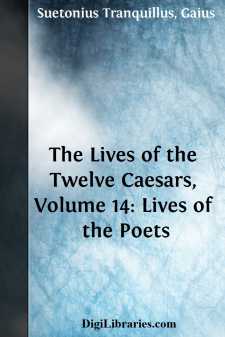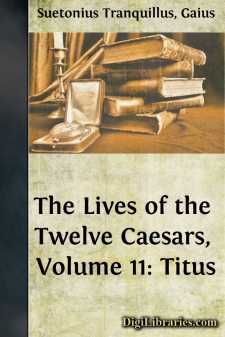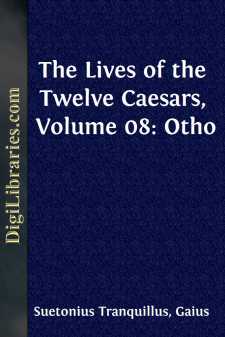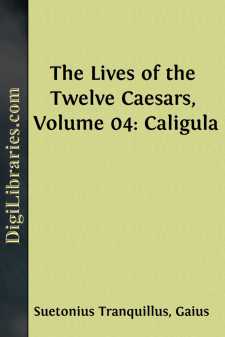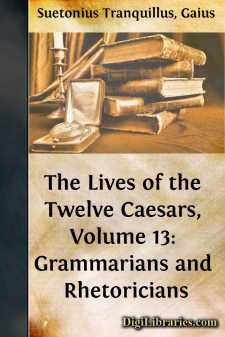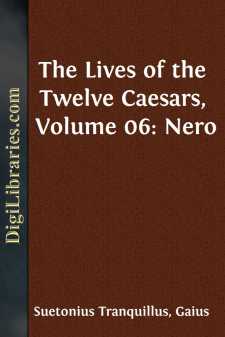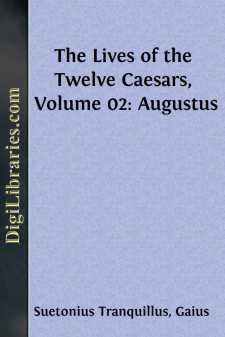Categories
- Antiques & Collectibles 13
- Architecture 36
- Art 48
- Bibles 22
- Biography & Autobiography 813
- Body, Mind & Spirit 142
- Business & Economics 28
- Children's Books 14
- Children's Fiction 11
- Computers 4
- Cooking 94
- Crafts & Hobbies 4
- Drama 346
- Education 46
- Family & Relationships 57
- Fiction 11829
- Games 19
- Gardening 17
- Health & Fitness 34
- History 1377
- House & Home 1
- Humor 147
- Juvenile Fiction 1873
- Juvenile Nonfiction 202
- Language Arts & Disciplines 88
- Law 16
- Literary Collections 686
- Literary Criticism 179
- Mathematics 13
- Medical 41
- Music 40
- Nature 179
- Non-Classifiable 1768
- Performing Arts 7
- Periodicals 1453
- Philosophy 64
- Photography 2
- Poetry 896
- Political Science 203
- Psychology 42
- Reference 154
- Religion 513
- Science 126
- Self-Help 84
- Social Science 81
- Sports & Recreation 34
- Study Aids 3
- Technology & Engineering 59
- Transportation 23
- Travel 463
- True Crime 29
The Lives of the Twelve Caesars, Volume 14: Lives of the Poets
Description:
Excerpt
THE LIFE OF TERENCE.
Publius Terentius Afer, a native of Carthage, was a slave, at Rome, of the senator Terentius Lucanus, who, struck by his abilities and handsome person, gave him not only a liberal education in his youth, but his freedom when he arrived at years of maturity. Some say that he was a captive taken in war, but this, as Fenestella [925] informs us, could by no means have been the case, since both his birth and death took place in the interval between the termination of the second Punic war and the commencement of the third [926]; nor, even supposing that he had been taken prisoner by the Numidian or Getulian tribes, could he have fallen into the hands of a Roman general, as there was no commercial intercourse between the Italians and Africans until after the fall of Carthage [927]. Terence lived in great familiarity with many persons of high station, and especially with Scipio Africanus, and Caius Delius, whose favour he is even supposed to have purchased by the foulest means. But Fenestella reverses the charge, contending that Terence was older than either of them. Cornelius Nepos, however, (532) informs us that they were all of nearly equal age; and Porcias intimates a suspicion of this criminal commerce in the following passage:—
"While Terence plays the wanton with the great, and recommends himself to them by the meretricious ornaments of his person; while, with greedy ears, he drinks in the divine melody of Africanus's voice; while he thinks of being a constant guest at the table of Furius, and the handsome Laelius; while he thinks that he is fondly loved by them, and often invited to Albanum for his youthful beauty, he finds himself stripped of his property, and reduced to the lowest state of indigence. Then, withdrawing from the world, he betook himself to Greece, where he met his end, dying at Strymphalos, a town in Arcadia. What availed him the friendship of Scipio, of Laelius, or of Furius, three of the most affluent nobles of that age? They did not even minister to his necessities so much as to provide him a hired house, to which his slave might return with the intelligence of his master's death."
He wrote comedies, the earliest of which, The Andria, having to be performed at the public spectacles given by the aediles [928], he was commanded to read it first before Caecilius [929]. Having been introduced while Caecilius was at supper, and being meanly dressed, he is reported to have read the beginning of the play seated on a low stool near the great man's couch. But after reciting a few verses, he was invited to take his place at table, and, having supped with his host, went through the rest to his great delight. This play and five others were received by the public with similar applause, although Volcatius, in his enumeration of them, says that "The Hecyra [930] must not be reckoned among these."
The Eunuch was even acted twice the same day [931], and earned more money than any comedy, whoever was the writer, had (533) ever done before, namely, eight thousand sesterces [932]; besides which, a certain sum accrued to the author for the title....


